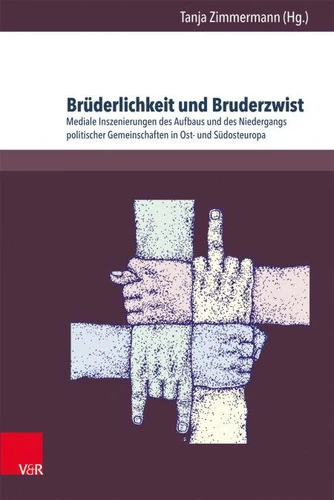Brüderlichkeit und Bruderzwist. Mediale Inszenierungen des Aufbaus und des Niedergangs politischer Gemeinschaften in Ost - und Südosteuropa
Par : , , , ,Formats :
Disponible dans votre compte client Decitre ou Furet du Nord dès validation de votre commande. Le format PDF est :
- Compatible avec une lecture sur My Vivlio (smartphone, tablette, ordinateur)
- Compatible avec une lecture sur liseuses Vivlio
- Pour les liseuses autres que Vivlio, vous devez utiliser le logiciel Adobe Digital Edition. Non compatible avec la lecture sur les liseuses Kindle, Remarkable et Sony
 , qui est-ce ?
, qui est-ce ?Notre partenaire de plateforme de lecture numérique où vous retrouverez l'ensemble de vos ebooks gratuitement
Pour en savoir plus sur nos ebooks, consultez notre aide en ligne ici
- Nombre de pages551
- FormatPDF
- ISBN978-3-8470-0136-2
- EAN9783847001362
- Date de parution17/09/2014
- Protection num.pas de protection
- Taille5 Mo
- Infos supplémentairespdf
- ÉditeurV&R Unipress
Résumé
Whenever different social strata, religious communities, ethnic groups or nations were to be united in one political movement or in one state in Eastern Europe, the initiators usually appealed to their purported "brotherliness". Various overarching common traits were invoked, different traditions were called into action: from early Christianity to communism, from secret associations to proletarian alliances and partisan associations, from blood relationships (probratimstvo) to multinational states (Soviet Union, Czechoslovakia, Yugoslavia), from pan-Slavism in all its forms to Tito's "Third Way".
The rhetoric and media enactments spanned from the commitment to metaphorical brotherly love to enforced affiliations to extortionate "family clans" that asserted their political goals through bio-politics and racism.
The rhetoric and media enactments spanned from the commitment to metaphorical brotherly love to enforced affiliations to extortionate "family clans" that asserted their political goals through bio-politics and racism.
Whenever different social strata, religious communities, ethnic groups or nations were to be united in one political movement or in one state in Eastern Europe, the initiators usually appealed to their purported "brotherliness". Various overarching common traits were invoked, different traditions were called into action: from early Christianity to communism, from secret associations to proletarian alliances and partisan associations, from blood relationships (probratimstvo) to multinational states (Soviet Union, Czechoslovakia, Yugoslavia), from pan-Slavism in all its forms to Tito's "Third Way".
The rhetoric and media enactments spanned from the commitment to metaphorical brotherly love to enforced affiliations to extortionate "family clans" that asserted their political goals through bio-politics and racism.
The rhetoric and media enactments spanned from the commitment to metaphorical brotherly love to enforced affiliations to extortionate "family clans" that asserted their political goals through bio-politics and racism.






